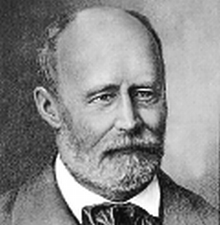Paul de Lagarde
Appearance

Paul Anton de Lagarde (2 November 1827 – 22 December 1891) was a German polymath, biblical scholar and orientalist. He has been cited as one of the greatest orientalists of the 19th century. The bitterness of his extreme antisemitism appeared in his writing.
Quotes
[edit]- What was most repulsive at the meetings was the stench of the guild, which assailed me everywhere: intellectual proletariat, that labors on its humdrum articles in the sweat of its brow, that does not know that science is to make one free and happy.
- Paul de Lagarde describing an 1851 convention of philologists, from Paul de Lagarde: Erinnerungen aus seinem Leben für die Freunde zusammengestellt (1894), S. 21, as cited in The Politics of Cultural Despair (1961), p. 12, note
- Es ist das höchste Glück des Menschen, anzubeten, oder, milder gesagt, andre Menschen über sich anzuerkennen, die er liebt und die ihn lieben.
- Paul de Lagarde: Erinnerungen aus seinem Leben für die Freunde zusammengestellt (1894), S. 40
- Man’s greatest joy is to revere other men, or to put it less extravagantly, to recognize other men above himself, and to love and be loved by these men.
- as cited in The Politics of Cultural Despair (1961), p. 29
- Man’s greatest joy is to revere other men, or to put it less extravagantly, to recognize other men above himself, and to love and be loved by these men.
- Paul de Lagarde: Erinnerungen aus seinem Leben für die Freunde zusammengestellt (1894), S. 40
- Our speech has ceased to speak, it shouts; it says cute, not beautiful, colossal, not great; it cannot find the right word any more, because the word is no longer the designation of an object, but the echo of some kind of gossip about the object.
- “Zum Unterrichtsgesetze,” as cited in The Politics of Cultural Despair (1961), p. 31
Quotes about Lagarde
[edit]- In many ways, Lagarde with his tempestuous moods had remained a child, wounded, frightened, craving the affectionate recognition of others, yet so fearful of losing his independence that he rebuffed and insulted the very friends he sought.
- Frtiz Stern, The Politics of Cultural Despair (1961), p. 26
- Lagarde … was more closely attuned to the sufferings of other men and the shortcomings of his culture than those healthy people who were caught up in the bounding advance of their society.
- Frtiz Stern, The Politics of Cultural Despair (1961), p. 28
- Lagarde … sneered at the real, the practical world; he distrusted positivism, loathed materialism, and mocked progress.
- Frtiz Stern, The Politics of Cultural Despair (1961), p. 30
- In his depracation of the political and economic man, of the common man of everyday life, and of the political culture that adapts itself to him, he appeared as an idealist because he had turned his back on modernity, on practicality, because he preferred to legislate for an implausible future rather than to reform an intractable present.
- Frtiz Stern, The Politics of Cultural Despair (1961), p. 34

